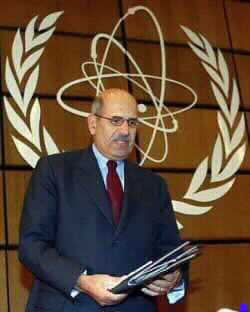HIGLIGHTS Pyongyang Accuses Washington of Plotting Atomic War & Threatens US with Destruction if Attacked|| In Contrast with Standoff with Iraq, Bush is Prepared to Open Dialogue with N. Korea|| If IAEA Reports Pyongyang in Breach of Nuclear Safe Guards to UN Security Council, the International Body Has Power to Authorize Military Action|| Japan Joins S. Korea in Seeking Diplomatic Solution to Standoff|| STORYThe U.N.'s nuclear watchdog gave North Korea one last chance on Monday to readmit inspectors expelled a week ago, as the reclusive communist state defiantly accused the United States of plotting atomic war.
As the United States, South Korea and Japan sought a solution to the escalating crisis between Washington and Pyongyang over the North's suspected atomic weapons program, President Bush said he was prepared to reopen a dialogue with North Korea.
But U.S. officials said talks could start only after North Korea dismantled its nuclear weapon programs.
North Korea has indicated it wants face-to-face talks with the United States, but there seemed little prospect that Bush's comments offered a breakthrough in the nuclear standoff, with officials doubting it signaled a change in U.S. policy.
A White House official said: "We've made very clear that a prerequisite for dialogue is they (the North Koreans) dismantle their nuclear weapons program, live up to what they said they would do in the first place."
The State Department said earlier that Washington had no intention of striking a new deal to replace a 1994 agreement, which mothballed -- under U.N. supervision -- a North Korean nuclear complex capable of producing weapons-grade plutonium in return for free oil and safe nuclear reactors.
Washington halted the oil shipments from December after saying Pyongyang had admitted to a covert nuclear program.
BREACHING NUCLEAR SAFEGUARDS
North Korea, which has said its decision to reactivate its nuclear program was an act of self-defense and that a peaceful solution required dialogue, was ordered on Monday to reverse course by the International Atomic Energy Agency.
The U.N. watchdog passed a resolution saying North Korea had to cooperate or be reported to the U.N. Security Council for breaching nuclear safeguards. The IAEA board set no deadline at its emergency meeting in Vienna.
But agency chief Mohamed ElBaradei said Pyongyang -- which vowed the destruction of the United States if Washington attacked -- had "one more chance" and told a news conference: "It's clearly a matter of weeks."
The IAEA board demanded immediate talks with North Korea.
The toughly worded resolution said the IAEA "calls upon the DPRK (North Korea) to cooperate urgently and fully with the agency by allowing the re-establishment of the required containment and surveillance measures at its nuclear facilities and ... the return of IAEA inspectors."
The United States, which consulted with its Asian allies in Washington on Monday on how to persuade North Korea to give up its nuclear ambitions, welcomed the IAEA resolution.
"POLICY OF DEFIANCE"
If North Korea is reported to the Security Council, the body has the power to authorize military action.
Voicing defiance before the IAEA decision, North Korea denounced Washington's missile defense system and threatened the United States with destruction if it launched a nuclear attack over Pyongyang's suspected atomic weapons program.
Washington -- in contrast with its stance on Iraq's alleged weapons of mass destruction -- has been at pains to emphasize it seeks a diplomatic solution to the crisis with Pyongyang, but has reacted coolly to Seoul's offer to mediate talks.
In Washington, South Korean officials presented Seoul's plan to reduce tensions to U.S. and Japanese delegates at a regular meeting of a trilateral oversight group. They will issue a statement after they meet again on Tuesday.
The U.S.-North Korean war of words has prompted South Korean President Kim Dae-jung to send a top security aide to Washington on Tuesday.
Also joining diplomatic efforts to cool tensions is Japanese Prime Minister Junichiro Koizumi, who begins a four-day visit to Russia on Thursday
PHOTO CAPTION
Mohamed ElBaradei, director of the International Atomic Energy Agency (IAEA), stands in front of the agency's logo prior to a board meeting in the Vienna headquarters January 6, 2003. (Herwig Pramme
- Author:
News Agencies - Section:
WORLD HEADLINES


 Home
Home Discover Islam
Discover Islam Quran Recitations
Quran Recitations Lectures
Lectures
 Fatwa
Fatwa Articles
Articles Fiqh
Fiqh E-Books
E-Books Boys & Girls
Boys & Girls  Women
Women










